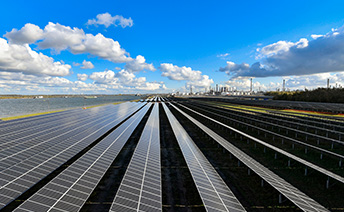Offshore Energies UK (OEUK, formerly OGUK)
OEUK is the leading representative body for the UK offshore energy industries, including upstream oil and gas, carbon capture and storage, hydrogen and offshore wind.[1]
Membership of board/executive committee: Shell is a member of the OEUK board.
- 2022 assessment outcome: Aligned
- 2021 assessment outcome: Aligned
Summary
Shell benefits from its membership of OEUK, especially in relation to energy and fiscal policy, environment, decommissioning, gas market regulation and health and safety.
We welcome the 2022 rebranding of Oil and Gas UK (OGUK) to OEUK, which reflects the energy transition journey of its members.
We have found OEUK to be aligned with our climate and energy transition-related policy positions.
We will encourage OEUK to:
- Support ending routine flaring sooner than 2030. OEUK already supports ending routine flaring by 2030, but we encourage efforts to bring that date forward.
- Support improving energy efficiency through standards and regulatory instruments covering key sectors of the economy.
We will remain a member of OEUK. We will continue to engage the association on climate and energy transition topics. We will continue to track alignment between OEUK’s climate and energy transition-related positions and our own.
Further information
Click on the sections below to read more.
- OEUK has stated support for the UK’s net-zero emissions by 2050 target.[2] [3]
- OEUK has stated support for the North Sea Transition Deal which sets out key commitments to help transition to net-zero emissions by 2050.[4]
- In its 2022 response to the UK government’s consultation on a climate compatibility checkpoint for future oil and gas licensing in the UK Continental Shelf, OEUK stated that the checkpoint “will play an important role in demonstrating that ongoing exploration and production for oil and gas is consistent with the UK’s statutory requirement to achieve net zero by 2050 and should align with the OGA Strategy of maximising economic recovery and net zero emissions targets”.[5]
- OEUK stated support for the UK Emissions Trading System, which replaced the EU scheme in the UK in 2021.[6] [7]
- In its Economic Report 2022, OEUK states higher carbon prices can “stimulate investment in emissions reductions projects, which could support industry’s progress towards its 50% emissions reduction target by 2030”.[8]
- OEUK has stated support for improving energy efficiency in the UK.[9]
- OEUK has stated support for the role of hydrogen, including hydrogen produced by electrolysis, and natural gas reforming with CCS.[10]
- OEUK has stated support for the North Sea Transition Deal, of which hydrogen is a key decarbonisation pillar.[11]
- In its Economic Report 2022, OEUK states the importance of the UK developing demand for low-carbon hydrogen and creating the business models for investment in storage; it also states that OEUK calls on government to “accelerate UK hydrogen production with clarity on investment models and regulations”.[12]
No position
- OEUK has stated support for policy mechanisms to drive the deployment of carbon capture, utilisation and storage (CCUS).[13]
- OEUK has stated support for the North Sea Transition Deal, of which CCUS is a key decarbonisation pillar.[14] [15]
- In its CCS Supply Chain Report 2022, OEUK set out recommendations for how the UK supply chain can be strengthened to support the CCS industry, and to provide “actionable insight for policy-makers”.[16] [17]
- One of the roles of the OEUK’s CCUS Forum is to liaise with regulators to help advance CCUS.[18]
- OEUK has stated support for ESG reporting and for the phased implementation of the disclosure framework provided by the Task Force on Climate-related Financial Disclosures.[19] [20]
- OEUK’s ESG Forum in September 2022 focused on understanding the role of ESG in long-term sector goals and in driving business value.[21]
- In OEUK’s 2022 “Investing in the Transition” paper, OEUK states that “managing the numerous financial regulation standards governing climate reporting to meet investor needs will be paramount to all businesses.”[22]
- OEUK has stated it would “welcome the opportunity to engage with the government and the OGA on a framework for reporting climate-related disclosure and green taxonomy”.[23]
No position
- OEUK has stated support for accelerating “electrification across society (e.g. transport and heating) in step with offshore wind expansion”.[24] In 2022, OEUK also hosted an event, “Electrification in the Making”, that involved industry, government and regulator representatives, and aimed to help progress the electrification of offshore oil and gas facilities.[25]
- OEUK has stated support for the role of natural gas and low-carbon gases in the energy transition.[26] OEUK has stated support for the role of gas in support of renewables in power.[27]
- OEUK has stated support for reducing methane emissions, including through regulations based on robust monitoring, reporting and verification frameworks.[28] OEUK published a Methane Action Plan in 2021, which was a key deliverable of the North Sea Transition Deal (NTSD).[29] OEUK is a supporting organisation of the Methane Guiding Principles.[30]
- OEUK produced Methane Action Plan Guidelines 2022 to support the industry in developing Asset Methane Action Plans.[31]
- In its 2022 response to the UK government’s consultation on a climate compatibility checkpoint for future oil and gas licensing in the UK Continental Shelf, OEUK stated that it “is supportive of benchmarking the basin’s performance as a global average against a fully representative sample of producing basins. The benchmarking should include transportation emission, methane and other GHG emissions.”[32]
- OEUK has stated support for the World Bank’s Zero Routine Flaring by 2030 initiative.[33]
No position
No position
No position
No position
No position
[1] https://oeuk.org.uk/who-we-are-offshore-energy-industry/
[2] http://www.oeuk.org.uk/net-zero/
[3] https://oeuk.org.uk/wp-content/uploads/2023/03/OEUK-response-to-Net-Zero-Review.pdf
[4] http://oeuk.org.uk/the-north-sea-transition-deal/
[5] https://oeuk.org.uk/wp-content/uploads/2022/11/OEUK-Consultation-Response-28.02.2022-Designing-a-climate-compatibility-checkpoint-for-future-oil-and-gas-licensing-in-the-UK-.pdf
[6] http://oeuk.org.uk/product/product-production-emissions-targets-report/
[7] http://www.oeuk.org.uk/product/uk-energy-policy-driving-the-transition/
[8] https://oeuk.org.uk/wp-content/uploads/2022/09/Economic-Report-2022-Offshore-Energies-UK-OEUK.pdf
[9] http://www.oeuk.org.uk/product/product-production-emissions-targets-report/
[10] http://www.oeuk.org.uk/product/economic-report-2022/
[11] http://www.oeuk.org.uk/the-north-sea-transition-deal/
[12] http://www.oeuk.org.uk/product/economic-report-2022/
[13] http://www.oeuk.org.uk/product/uk-energy-policy-driving-the-transition/
[14] http://www.oeuk.org.uk/the-north-sea-transition-deal/
[15] https://oeuk.org.uk/wp-content/uploads/2022/11/OEUK-Consultation-Response-28.02.2022-Designing-a-climate-compatibility-checkpoint-for-future-oil-and-gas-licensing-in-the-UK-.pdf
[16] https://oeuk.org.uk/wp-content/uploads/2022/07/NSTD-CCS-Supply-Chain-Report-2022-OEUK.pdf
[17] http://www.linkedin.com/posts/offshoreenergiesuk_earlier-this-year-we-published-the-first-activity-6989133260614160384-Tla5?utm_source=share&utm_medium=member_desktop
[18] http://www.oeuk.org.uk/forum-and-workgroup/ccus-forum/
[19] http://www.oeuk.org.uk/product/uk-energy-policy-driving-the-transition/
[20] http://www.oeuk.org.uk/product/investing-in-the-transition/
[21] http://www.linkedin.com/posts/offshoreenergiesuk_corporatesocialresponsibility-offshoreindustry-activity-6973264001220628481-gEcR?utm_source=share&utm_medium=member_desktop
[22] http://www.oeuk.org.uk/product/investing-in-the-transition/
[23] http://www.oeuk.org.uk/product/uk-energy-policy-driving-the-transition/
[24] http://www.oeuk.org.uk/product/economic-report-2022/
[25] http://www.oeuk.org.uk/wp-content/uploads/2022/04/OEUK-Electrification-Conference-Enhanced-Presence.pdf
[26] http://www.oeuk.org.uk/product/uk-energy-policy-driving-the-transition/ (accessed 2 December 2022)
[27] https://oeuk.org.uk/wp-content/uploads/2021/04/UK-Energy-Policy-Driving-the-Transition.pdf
[28] https://oeuk.org.uk/wp-content/uploads/2021/06/OGUK-Methane-Action-Plan-2021.pdf
[29] http://www.oeuk.org.uk/product/methane-action-plan-2021/
[30] https://methaneguidingprinciples.org/signatories-and-supporting-organisations/#organisations
[31] http://www.oeuk.org.uk/product/methane-action-plan-guidelines-2022/
[32] https://oeuk.org.uk/wp-content/uploads/2022/11/OEUK-Consultation-Response-28.02.2022-Designing-a-climate-compatibility-checkpoint-for-future-oil-and-gas-licensing-in-the-UK-.pdf
[33] http://www.oeuk.org.uk/product/methane-action-plan-2021/










